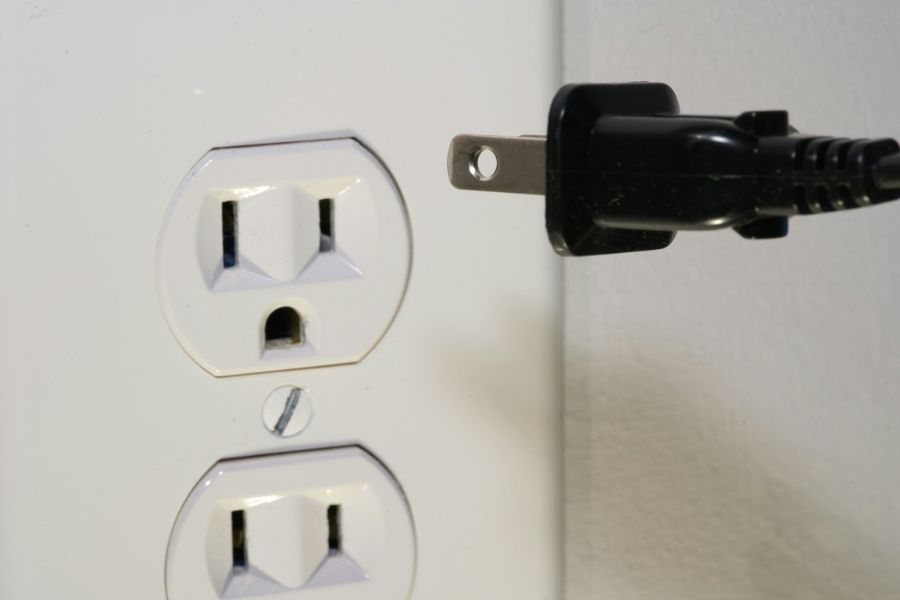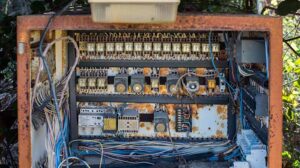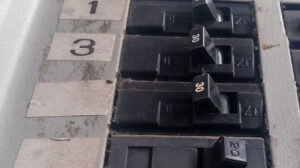We’ve all experienced that moment of frustration: you plug in your device, and nothing happens! Maybe the outlet has been going bad for a while, or maybe you experience a sudden loss of power. Whatever the reason, we’d like to offer you some tips and tricks if you’re wondering why an electrical outlet stopped working in your home or business:
An outlet might stop working due to a tripped circuit breaker, blown fuse, or faulty outlet itself. Loose or disconnected wiring and GFCI outlet issues, especially in moisture-prone areas, can also cause problems. Additionally, electrical panel issues or external factors like utility work or power outages might disrupt an outlet’s function.
Below we’ll discuss each of these issues and offer some potential solutions:
Top reasons why an outlet stops working
1. Tripped circuit breaker
One of the most common reasons for an outlet to be non-functional is that the circuit breaker has tripped. Circuit breakers are designed to protect you home’s electrical system by shutting off the flow of electricity if they detect an overload or short circuit. If this happens, then a portion of the outlets in your house may all stop working suddenly.
What to do:
Check your circuit breaker box. Locate your home’s breaker box and look for any switches that are in the off position (aka, they are not aligned with the others). Reset the tripped breaker by switching it back on, then try again.
If this solves the issue, you may want to identify if there are any obvious sources of the overload. Consider what devices you were using when the circuit breaker tripped. You may have too many high-powererd appliaces connected to one outlet. If your circuit breaker continues to trip, then read through our article on what to do when your circuit breaker keeps tripping.
2. Blown fuse
This is less common nowadays, but older homes with fuse boxes still experience this failure from time to time. Fuses serve the same protective function as circuit breakers, and they can blow if you connect too many devices to the outlet or otherwise have too much power flowing through it.
What to do:
Inspect the fuse box. If your home has a fuse box, inspect it and look for any fuses that appear burnt or broken. If you find the blown fuse, be sure to replace it with one of the same rating to avoid electrical issues in the future.
3. Faulty outlet
Sometimes the outlet itself is the problem. Just like any mechanical device, outlets wear out over time. Even if it didn’t wear out, it may have been subjected to damage due to external factors or some type of impact to the equipment.
What to do:
Perform a quick inspection of the outlet. Inspect your outlet for signs of damage, such as discoloration or cracks. Gently touch the outlet and see if it’s a warm or hot outlet. Additionally, note any burning smells or smoke coming from the outlet. All of these can be signs that the outlet has gone bad and needs to be replaced.
If you’ve got access to a multimeter, check the voltage. If there’s no reading, the outlet may need to be replaced.
4. Loose or disconnected electrical wiring
Loose or disconnected wires can interrupt the flow of electricity and cause an outlet to stop working. First, check that the outlet hasn’t come loose from the wall, then perform some additional checks:
What to do:
Turn off the power and check the connections. Go to your circuit breaker and ensure that the power to the outlet is switched to the “off” position. Then, carefully remove the outlet cover and check for any loose connecting wires. Sometimes it’s obvious if a wire is loose or has gone bad.
Note that if you’re uncomfortable performing these kinds of checks, we do recommend that you consult a professional to check the wiring for you. In particular, if you’re unsure how to turn off the power, get in touch with an electrician to perform the checks instead. Loose wiring can be dangerous.
5. Ground fault circuit interrupter (GFCI) issues
GFCI outlets are designed to protect against electrical shocks, especially in areas prone to moisture like kitchens, bathrooms, and outdoors. These outlets can trip and interrupt the flow of power to the connected appliances.
What to do:
Reset the outlet, and test other GFCI outlets in the vicinity. Look for the reset button on the GFCI outlet and press it to attempt to restore power.
One thing to note is that sometimes one GFCI outlet can affect others on the same circuit. We recommend that if the check above didn’t work for you, check and reset all GFCI outlets in the area.
6. Electrical panel problems
Sometimes the issue originates from the electrical panel itself. It is true that electrical panels go bad and connections can wear out over time. If it turns out that something is wrong with the panel itself, it’s likely that you’ll need to get a professional involved.
What to do:
Inspect the panel, and seek professional help if you detect signs of damage. Find your electrical panel and look for signs of wear or damage, inside and out. Another thing to watch out for is signs of moisture getting into the electrical panel.
As stated above, we recommend that if you detect any issues with the panel, you should get in touch with a professional. Replacing panels is not something you should attempt to do yourself, and in many cases requires permits and approval.
7. External factors
One thing we must mention here: it’s possible that the reason your outlet isn’t working has nothing to do with your wiring or panels at all. Sometimes external factors like utility work or natural events (e.g. storms) can disrupt power to your property or even to specific circuits.
What to do:
If nothing has worked so far, check with your neighbors and call your utility company. It should be obvious whether other people in your area are also experiencing problems, and the utility company should be able to report whether there’s been outages or work in the area.
What if nothing works?
While some troubleshooting steps can be safely performed by homeowners or business owners, many electrical issues can only be diagnosed and fixed by a licensed electrician.
Note that electrical work can be dangerous, and safety should always be your top priority.
If you experience repeated problems, or if the solutions above don’t work for you, seek professional help. If you’re anywhere in the St. Simons Island or Brunswick, GA area, get in touch with us today!







